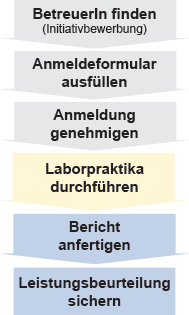Lab internships

Trying out different research directions at the beginning of your scientific career is one of the most valuable experiences and your advantages as a student. After you've narrowed down your research interest, consider what knowledge and skills will be most useful for you in the next steps. Attend job fairs, lectures and workshops on campus and online; consult your peers, group leaders and other students working in your field of interest to proactively shape your career and develop your research profile.
Laboratory internships (depending on the Master program, they are called Wahlbeispiele, Vertiefungsübungen, Großpraktikum, etc as well as the Erasmus stay-abroad projects) must be planned well in advance. Finding the lab for your lab rotation or your Master project is not easy: try to contact potential advisors early on (e.g., through an unsolicited email application) and explain your interest in joining their lab. You can also approach potential supervisors by attending their lectures, practicals, talks, etc.
It is, in principle, possible to perform the lab internships in the for-profit partners. When applying for such internships, please prepare a rough summary of the project you will be involved in. The decisive factor here is that you will be working on a research project, addressing a specific research question or working hypothesis; it is NOT allowed to work simply in the technician's capacity (routine measurements, sample processing, etc).
By the end of the internship, you must prepare a written report, which should outline the knowledge gaps, research questions/hypothesis and contain some real data used to address the explicitly formulated research question or hypothesis.
